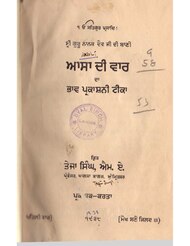This article may require copy editing for excessive use of italics, incorrect capitalization, and MOS:PSEUDOHEAD. (July 2023) |
 Teeka (exegesis) on the Sikh "Asa Di Vaar" Composition |
| Part of a series on |
| Sikh literature |
|---|
 |
| Sikh scriptures • Punjabi literature |
A steek or teeka [other spellings may exist such as stik or tika] (Gurmukhi: ਸਟੀਕ, romanized: steek; 'Exegesis') is an exegesis or commentary on a Sikh Religious Text,[1][2] usually Gurbani, but can also include other writings like the Ghazals of Bhai Nand Lal. An author of a steek or teeka is known as a teekakar (Gurmukhi: ਟੀਕਾਕਾਰ).[1] A steek always includes an explanation, or viakhya (Gurmukhi: ਵ੍ਯਾਖ੍ਯਾ)[1] of the specific religious text, but depending on the complexity of the steek, it can also include footnotes, commentary, and contexts to the specific verses and where they were first written/revealed (known as an "Uthanka" [Gurmukhi: ਉਥਾਨਕਾ]).
There are different characteristics and variations between steeks. Traditional Sikh Commentaries on Sikh Scripture is known as a Sampardai Steek/Teeka (Gurmukhi: ਸੰਪ੍ਰਦਾਈ ਟੀਕਾ/ਸਟੀਕ), and usually includes more detailed exegesis of Sikh Scripture.
© MMXXIII Rich X Search. We shall prevail. All rights reserved. Rich X Search
